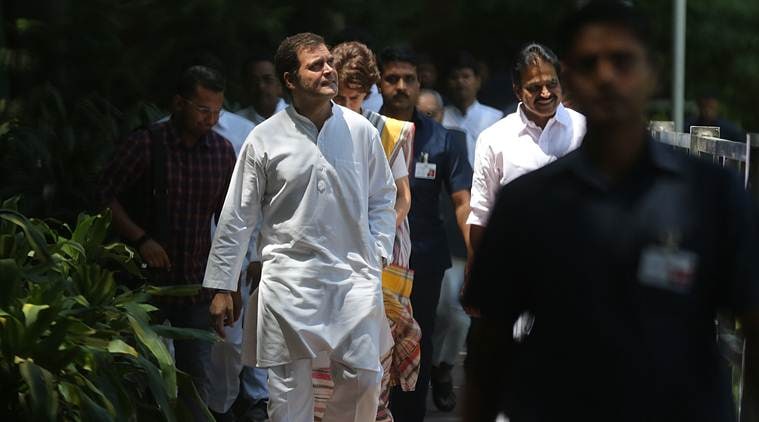
“There is nothing in the world more powerful than a good story. Nothing can stop it. No enemy can defeat it.” These words were spoken on a popular television serial on the last day of polling, eerily enough, to clinch a series-ending coronation. They could just as well have been written for Narendra Modi.
The Congress lost this election on the day in December that it won the elections to the Rajasthan, Madhya Pradesh and Chhattisgarh assemblies.
Before that, the electorate seemed restive, and the various regional Opposition parties seemed to fancy their chances if they came together. With the weakened Congress as just one of the players, maybe a bit bigger and stronger, but not by much, there were many who could see themselves as contenders for the prime minister’s position. The Congress’s three-state win changed all that.
But, handed a golden opportunity to define itself, the Congress indicated it had nothing new to offer, not even a fresher and younger leadership. Instead of a reinvigorated young party, which matched its new leader, the party reposed its faith in its old guard, with some indecisive to-ing and froing thrown in for free.
It started bargaining with other parties as if it would win many more seats than them, unwilling to be generous in stitching together a national coalition that traded seats in one state for another and refusing to be constructively ambiguous as to the top job. Secure (falsely, as it turned out) in their beliefs that their citadels were strong regardless of who was in power in Delhi, and without that lure, the enthusiasm of the regional parties waned. But, by continuing to talk to prospective partners, and almost agreeing to a coalition and then not, the Congress appeared indecisive and amateurish, reinforcing the BJP’s constant characterisation of its leader as an inconsequential youth.
Ultimately, the myriad conceptions of secularism proved insufficient to glue the parties together. Indeed, as the old guard in the states promptly set about cutting their intra-party challengers down to size, questions arose about the unity of the Congress itself.
For Modi, on the other hand, these losses brought opportunities and lessons. Two long-standing BJP chief ministers, possible competitors, bit the dust. Complacent party workers were rudely awakened, and the party’s performance clearly indicated the geographies and sections that needed more attention. The PM-KISAN support scheme for farmers was an early response.
But, most importantly, Modi realised that he needed a new story. He had promised vikas, and one could argue about the extent that voters would think he had delivered, and whether anyone could be trusted to do better. But, running on the record was not a good enough story.
He needed a story that only he could tell. Fortuitously, the tragic incident at Pulwama demanded a response. Modi would possibly have taken the same decision about Balakot (as may have another prime minister) even without the election — in keeping with his image, as a person with the courage of his convictions, and the determination to act on them, an image from his demonetisation decision. Once scripted, more than Modi, it was Amit Shah, who hammered home the story, reportedly even saying: “Don’t give vote for development works to [BJP candidate]… vote for him because Narendra Modi made the country’s border secure”. Concomitantly, he projected the Congress as a loser, linked to Pakistan: “Everywhere there was a celebratory atmosphere but… hopelessness in Pakistan and in the Congress”. However, while the rhetoric had a laser-like focus on the border, other channels — social media, LED vans, campaign posters — continued with the sub-text of “development works”: Gas cylinders, toilets, houses and new cash transfer schemes.
The BJP effectively transformed any attempt to directly counter such a story into an attack on the integrity of our armed forces – political suicide.
The Congress did not have an alternative story. Despite being the party responsible for cleaving Pakistan into two, 26/11 trumped 16/12, rendering it speechless when a POW’s return became a famous victory — presumably clinching evidence of Pakistan’s capitulation. It could not script a story where people would believe that the border would be just as secure with them — that they were just as nationalist, and they would deliver, in addition, sachha vikas. Indeed, mired in garibi hatao, the Congress’ economic pitch couldn’t move from safety nets to springboards. Its counter to PM-KISAN was targeted to an elusive bottom fifth. Not only could it not weave a common story to leverage the strengths of other parties, many of whom remained mired in caste, it lost the one it had for itself. Besides, it was difficult to square its dynastic leaders — naamdaars, as the BJP pejoratively named them — with a story of popular aspiration, especially among the youth.
Modi’s story became the only one in the country, and no enemy could defeat it, barring a few regional storytellers. The coronation, as in the serial, was by acclamation. The cost to the Congress of winning the three state elections proved too high.